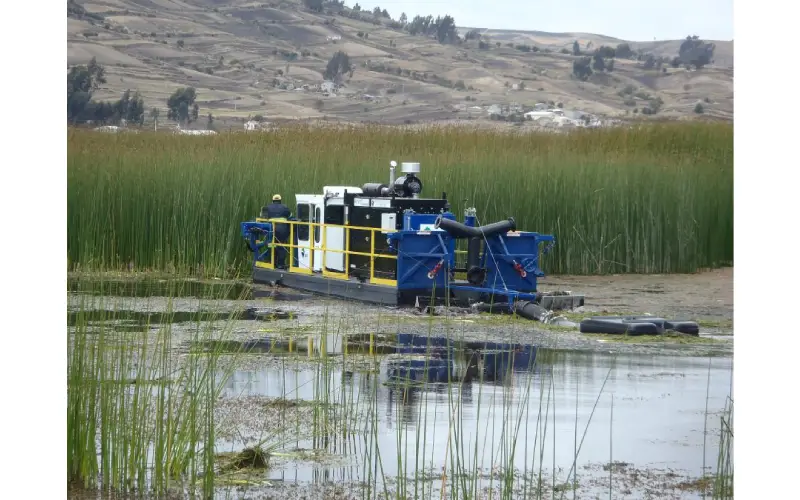Dredging projects are crucial for maintaining navigable waterways, harbors, and ports, ensuring they are free from sediment buildup and debris. However, these projects can often be time-consuming and costly. A dredge booster pump can revolutionize dredging operations by significantly enhancing efficiency and productivity. This innovative equipment increases the pumping distance, allowing for more extensive and effective dredging operations. By incorporating a dredge booster pump into your dredging projects, you can achieve better results while reducing operational costs and time.
The Role Of Aquatic Weed Harvesters In Maintaining Waterway Accessibility
Aquatic weed harvesters play a vital role in maintaining waterway accessibility by removing invasive plant species that can obstruct navigation and reduce the usability of water bodies. These machines are designed to cut, collect, and remove weeds from the surface and underwater, ensuring clear pathways for boats and other watercraft. By maintaining open and navigable waterways, aquatic weed harvesters support commercial activities, recreational use, and ecological balance, preventing the adverse effects of dense weed growth on aquatic ecosystems and human activities.

How Aquatic Weed Harvesters Contribute To Environmental Conservation?
Aquatic weed harvesters significantly contribute to environmental conservation by managing the growth of invasive plant species that can disrupt local ecosystems. By removing these invasive weeds, harvesters help restore native plant populations and maintain the natural balance of aquatic habitats. Additionally, the mechanical removal of weeds reduces the need for chemical treatments, which can harm aquatic life and water quality. This environmentally friendly approach supports biodiversity, improves water quality, and helps preserve the ecological health of lakes, rivers, and other water bodies.
Advancements In Aquatic Weed Harvesters And Their Impact On Waterway Management
Technological advancements in aquatic weed harvesters have revolutionized waterway management by enhancing the efficiency and effectiveness of weed removal operations. Modern harvesters are equipped with advanced cutting mechanisms, GPS systems for precise navigation, and automated controls that allow for more efficient and targeted weed removal. These innovations reduce operational costs, minimize environmental impact, and enable more comprehensive and accurate management of aquatic vegetation. As a result, waterways are better maintained, supporting both commercial and recreational activities while protecting aquatic ecosystems.
Economic Benefits Of Using Aquatic Weed Harvesters In Commercial Waterways
Using aquatic weed harvesters in commercial waterways offers significant economic benefits by ensuring that these vital transportation routes remain open and navigable. Clear waterways support shipping and transportation industries by preventing delays and disruptions caused by weed infestations. Additionally, well-maintained water bodies attract tourism and recreational activities, boosting local economies. The investment in aquatic weed harvesters can lead to long-term savings by reducing the need for costly and frequent manual clearing operations, ultimately supporting economic growth and sustainability in regions dependent on water-based commerce.
Operating Aquatic Weed Harvesters For Large-Scale Waterway Maintenance
Operating aquatic weed harvesters for large-scale waterway maintenance presents several challenges, including the management of vast areas, varying water depths, and diverse types of aquatic vegetation. Solutions to these challenges involve the use of specialized equipment designed for different conditions, such as harvesters with adjustable cutting depths and enhanced maneuverability. Training operators in best practices and employing integrated management strategies that combine mechanical, biological, and chemical methods can also improve efficiency. Collaborative efforts among stakeholders, including government agencies, environmental organizations, and local communities, are essential to overcoming these challenges and achieving successful large-scale maintenance.
Successful Implementation Of Aquatic Weed Harvesters In Various Regions
Numerous case studies demonstrate the successful implementation of aquatic weed harvesters in various regions, highlighting the benefits of this technology in maintaining healthy waterways. For example, in Florida’s Lake Okeechobee, aquatic weed harvesters have effectively managed invasive hydrilla and water hyacinth, preserving the lake’s ecological balance and supporting recreational activities. In Europe, the Rhine River has seen improved navigability and water quality through the use of advanced weed harvesting equipment. These examples illustrate how targeted interventions using aquatic weed harvesters can address specific challenges, leading to positive outcomes for both the environment and local economies.
Aquatic Weed Harvesters And Their Potential For Enhancing Waterway Navigation
The future of aquatic weed harvesters looks promising, with ongoing advancements in technology poised to further enhance waterway navigation. Innovations such as autonomous harvesters, improved energy efficiency through solar and hybrid power sources, and enhanced data analytics for real-time monitoring and decision-making are on the horizon. These trends will enable more precise and sustainable management of aquatic vegetation, reducing operational costs and environmental impact. As these technologies continue to evolve, the potential for aquatic weed harvesters to maintain and improve waterway navigation will only grow, supporting the long-term health and usability of aquatic environments.
Conclusion
Aquatic weed harvesters are indispensable tools in maintaining the accessibility, environmental health, and economic viability of waterways. By addressing the challenges of invasive plant species and adopting innovative technologies, these machines play a crucial role in sustainable waterway management. As we look to the future, the continued advancement and implementation of aquatic weed harvesters will be essential in preserving our vital water resources and ensuring they remain navigable and healthy for generations to come.

Fran Bullock, a literary explorer rooted in the charm of England, unearths stories that resonate with the echoes of history. With a quill dipped in nostalgia, she pens tales that bridge the past and present, weaving narratives that captivate the soul.




